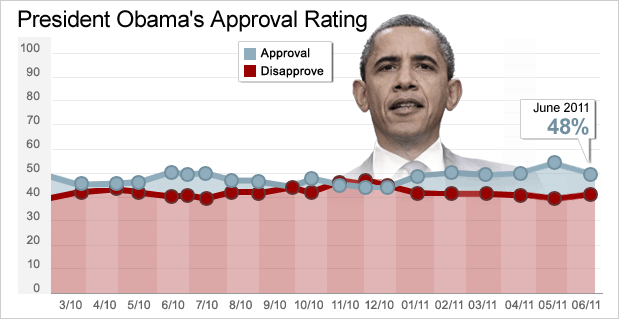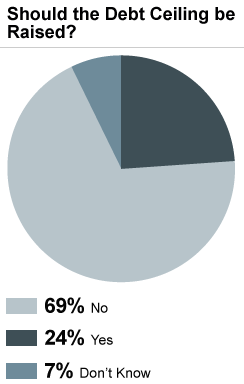Obama approval rating falls below 50 percent
CBS News Poll analysis by the CBS News Polling Unit: Sarah Dutton, Jennifer De Pinto, Fred Backus and Anthony Salvanto.
Updated 8 p.m. ET
President Obama's approval ratings fell to below 50 percent for the first time since his ratings spiked following the news of the death of Osama bin Laden last month, according to a CBS News poll released on Wednesday.
Just 48 percent of respondents approve of the way he is doing his job, compared to a 57 percent in the days immediately following news of bin Laden's demise.
Obama's approval numbers hovered in the range below 50 percent for most of the past year, though they spiked after the early May announcement that a team of elite Navy SEALs had captured and killed the al Qaeda.
About 79 percent of the poll respondents said the economy is in bad shape, essentially unchanged from April but higher than the 74 percent who reported the condition of economy as poor in January.
Perhaps more disturbing for the White House is that about a third of the people think the economy is headed in the wrong direction.
The U.S. economy added just 54,000 jobs in May, the fewest number of new workers in eight months. And the unemployment rate rose to 9.1 percent from 9.0 percent in April. No president has been re-elected since Franklin Roosevent when unemployment was above 7.2 percent.
It is too early to say whether those job figures are a one-time occurrence or the beginning of a trend, but the overall trendline for perceptions about the direction of the economy is headed downward. Just 21 percent of respondents thought the economy was getting worse in January, compared to 26 percent in March, 39 percent in April and 31 percent in the June poll.
And the economy is still far and away the most important issue on voters' minds. Jobs and the economy is the top category for 48 percent of respondents, almost five times as important as the next most important issue: the deficit. Just 10 percent of respondents said the ballooning budget deficit was the top issue. Health care garnered 4 percent, while education was top on the minds of 3 percent of respondents. The wars in Iraq and Afghanistan also took 3 percent. Those numbers are essentially unchanged from the prior survey.
The number of respondents who said the country is headed in the wrong direction was about 60 percent, compared to 31 percent who said it is on the right track. Those numbers are nearly identical to the May survey.
The Debt Ceiling and the Deficit
The poll also asked for opinions on the debate in Congress over whether to raise the nation's debt ceiling - the legal limit on how much the federal government can borrow. Sixty-nine percent of Americans in the poll say the debt ceiling should not be raised, while just 24 percent say that it should be raised.
A third of Americans think spending cuts should be part of any agreement on the debt ceiling, but more - 56 percent -- say the issue is so serious it should be decided on its own.
But the public expresses some concern about the economic consequences that could result from not raising the debt ceiling. Seventy-two percent think it is at least somewhat likely that the economy will take a severe downturn if the ceiling is not raised, but just 25 percent think that's very likely to occur. More than half say it is at least somewhat likely that Social Security, Medicare and veterans' payments won't be made, including 19 percent who think that's very likely to happen. Another 38 percent say the stoppage of payments for these programs is not very likely to happen if the nation's debt ceiling is not raised.
Those who think it is very likely that an economic downturn will occur if the debt ceiling isn't raised are more likely to support increasing it.
However, a majority of Americans (68 percent) say the debt ceiling will probably be raised. Even opponents of raising it expect that to happen.
Asked specifically about the way officials in Washington are handling the deficit, respondents gave poor marks across the board. About 63 percent of respondents disapproved of the way Obama was handling the issue, in line with the grade for congressional Democrats. Republicans in Congress fared slightly worse, with a 70 percent disapproval rating.
And while jobs and the economy trump all other issues as the nation's most pressing problem, when Americans are asked directly about the seriousness of the federal budget deficit, 75 percent say it is a very serious problem for the country right now - the highest percentage since CBS News began asking the question in 2003.
For months, lawmakers in Washington have been debating how best to lower the budget deficit. The public is now divided over whether or not changes to the Medicare program will be necessary in order to reduce the deficit. Forty-six percent think changes will be necessary, down from 57 percent in April, but 43 percent think changes to Medicare won't be necessary. A majority of Americans (61 percent) say it won't be necessary to raise their taxes in order to lower the deficit.
Poll: Most Republicans don't want Palin to run
Poll: Most want troops in Afghanistan reduced
Read the Complete Poll (PDF)
This poll was conducted among a random sample of 1,024 adults nationwide, interviewed by telephone June 3-7, 2011. The error due to sampling for results based on the entire sample could be plus or minus three percentage points. The error for subgroups is higher. This poll release conforms to the Standards of Disclosure of the National Council on Public Polls.

